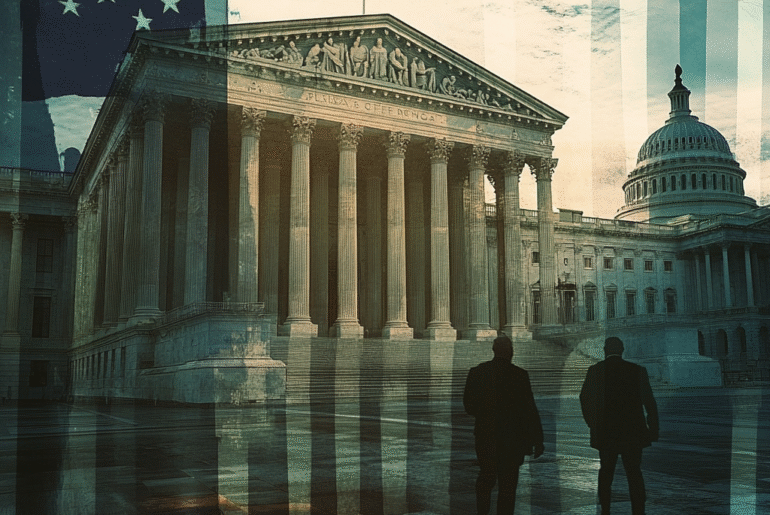This article may contain references to products or services from one or more of our advertisers or partners. We may receive compensation when you click on links to those products or services. Nonetheless, our opinions are our own.
The information presented in this article is accurate to the best of our knowledge at the time of publication. However, information is subject to change, and no guarantees are made about the continued accuracy or completeness of this content after its publication date.
You might have come across the news regarding Donald Trump and his associates and found the situation somewhat surprising. It can be difficult to distinguish between political strategy and personal beliefs when the distinction becomes unclear. “Trump World” is a place where unusual statements are made and policies are debated; it represents a mindset that influences people’s behavior, beliefs, and emotions, frequently leading to frustration. You might think that this way of thinking goes against your core beliefs and how you see the world.
For this, you’ll learn about the specific ideas and actions from Trump’s world that may have pushed you to your limit, as well as what these ideas mean for the future of political discourse and social cohesion. Your experience is a sign of a bigger problem: trying to balance your own beliefs with the growing number of populist ideas and divisive stories that seem to be taking over society.
- Trump World Narrative and Its Financial Implications
- Aggressive Negotiation & “Art of the Deal”
- Strategic Use of Debt
- Branding and Perceived Value over Intrinsic Value
- Opportunism and Adaptability
- Macroeconomic Policies and Individual Impact
- Recognizing the Risks to Your Financial Stability
- Identifying Opportunities Amid Political Turbulence
- Practical Steps to Safeguard Your Finances in Uncertain Times
- Embracing a Resilient Financial Mindset
- Empowering Yourself with Knowledge and Community
- Conclusion: Turning Political Anxiety into Financial Empowerment
- Frequently Asked Questions
- What specific idea from the Trump world has generated significant concern?
- How has this idea affected political discourse?
- Why does this idea resonate with many individuals?
- What real-world impact has this idea had on relationships and communities?
- What changes are hoped for as society pushes back against this mindset?
- What actions can individuals take to challenge this mindset locally?
- What is the ideal future if this mindset loses influence?
- Recommended Reads
Trump World Narrative and Its Financial Implications
As you try to make sense of the complicated “Trump World” story, you might wonder not only what it means for politics but also how it affects the economy and the markets. This story, full of populism and controversial language, has a big impact on how people feel about spending and investing. You should think about how a tense environment affects market volatility, which can change your investment strategies and overall financial stability.
- Market Sentiment: The discourse can lead to unpredictable movements in stock prices, so staying informed is crucial.
- Investment Opportunities: Some sectors may thrive in a pro-Trump economy, while others may languish, requiring you to be strategic about where you place your resources.
- Consumer Behavior: Understanding the shifts in public sentiment can help you predict spending trends, which may affect your business or investment choices.
| Sector | Potential Impact |
|---|---|
| Energy | Possible growth due to deregulation policies |
| Healthcare | Increased volatility based on policy debates |
| Technology | Innovation may thrive, but watch for regulatory changes |
Your financial strategy must adapt to this evolving landscape. Being proactive about how external events impact economic conditions will empower you to make more informed decisions, ultimately giving you a stronger grip on your financial future.
Aggressive Negotiation & “Art of the Deal”
- Lesson: Trump’s negotiation style, as famously outlined in “The Art of the Deal,” emphasizes leverage, walking away, and projecting strength. This can translate to an individual’s financial life in demanding better terms on loans, negotiating salaries, or finding the best deals on major purchases. It’s about being assertive and not settling for the first offer.
- Deep Dive/Underbelly: While effective for individuals in specific scenarios, Trump’s negotiation tactics have been criticized for being adversarial, bordering on bullying, and sometimes leading to strained relationships. In a broader economic context, this “game theory” approach (as described by some analysts) in trade negotiations, for example, led to trade wars and uncertainty, which can negatively impact businesses and consumers through higher costs and reduced access to markets. For individuals, this means knowing when to push hard and when to seek collaborative solutions. The line between being a shrewd negotiator and being ethically questionable can be blurry.
Strategic Use of Debt
- Lesson: Trump’s business empire was built, in part, on significant debt. This highlights the concept of leverage, where borrowed money amplifies returns on investment. For an individual, smart use of debt can mean taking out a mortgage to buy an appreciating asset or using a business loan to grow a profitable venture.
- Deep Dive/Underbelly: The flip side of high leverage is high risk. Trump’s business history is peppered with bankruptcies (e.g., Trump Taj Mahal, Trump Plaza Hotel), demonstrating the catastrophic consequences of over-leveraging and inability to meet obligations. For individuals, this means understanding debt’s risks, having a solid repayment plan, and maintaining a healthy debt-to-income ratio. The lesson isn’t “debt is always good,” but “debt, if managed poorly, can be ruinous.”
Branding and Perceived Value over Intrinsic Value
- Lesson: Trump excelled at branding and marketing, making his name synonymous with luxury and success, even when the underlying assets might have faced challenges. This emphasizes the power of perceived value. For personal finance, this could mean cultivating a strong professional image, networking effectively, and “selling” your skills and ideas.
- Deep Dive/Underbelly: Critics argue that this focus on “sizzle” sometimes overshadowed “steak” in his business ventures. The risk is that if the perceived value doesn’t align with the underlying reality, it can lead to disappointment or even financial losses for those who invest in or purchase based solely on the brand. For individuals, this means being wary of hype and doing due diligence before making significant financial commitments. Don’t buy into a “brand” without understanding the fundamentals.
Opportunism and Adaptability
- Lesson: Trump often seized opportunities, even in distressed markets. His acquisition of the Commodore Hotel and its transformation into the Grand Hyatt is a prime example of seeing potential where others saw decay. This speaks to the financial lesson of being opportunistic and adaptable, looking for value in unconventional places.
- Deep Dive/Underbelly: This opportunism can sometimes come at the expense of long-term planning or ethical considerations. Rapid shifts in strategy or a focus on short-term gains can lead to instability or undermine trust. For individuals, while seizing opportunities is good, it should be balanced with a well-thought-out financial plan and a clear understanding of your risk tolerance.
Voted "Best Overall Budgeting App" by Forbes and WSJ
Monarch Money helps you budget, track spending, set goals, and plan your financial future—all in one app.
Get 50% OFF your first year with code MONARCHVIP
Macroeconomic Policies and Individual Impact
- Tax Cuts:
- Lesson: The 2017 Tax Cuts and Jobs Act aimed to stimulate economic growth by lowering corporate and individual tax rates. For some, this meant more disposable income or increased business profits.
- Deep Dive/Underbelly: Critics argued these cuts disproportionately benefited the wealthy and corporations, contributing to increased national debt and potentially exacerbating income inequality. For the average individual, while they might have seen some tax relief, the long-term impact on social programs or economic stability due to increased debt could be a concern.
- Deregulation:
- Lesson: Reducing regulatory burdens on businesses, particularly in finance and energy, was intended to spur investment and economic activity.
- Deep Dive/Underbelly: While potentially beneficial for businesses, critics raise concerns about the loosening of environmental protections, increased financial risk (potentially leading to future crises), and a shift in power dynamics. For individuals, this might mean a greater need for vigilance regarding consumer protections or investment risks.
- Protectionism (Tariffs):
- Lesson: Imposing tariffs on imported goods aimed to protect domestic industries and jobs, promoting an “America First” agenda.
- Deep Dive/Underbelly: This led to trade wars with retaliatory tariffs, increasing costs for businesses (who had to pay more for imported materials) and consumers (who saw higher prices for goods). The Congressional Budget Office (CBO) projected Trump’s tariffs would reduce the economy, raise inflation, and reduce household purchasing power. This report highlights the complex, often negative, individual financial impacts of protectionist policies.
Recognizing the Risks to Your Financial Stability
In a time of financial uncertainty, it’s important to take a step back and figure out what risks could threaten your financial stability. Unpredictable decisions made by politicians and changes in the economy can significantly impact your finances. Here are some risks you should actively monitor:
- Market Fluctuations: Stock markets can be erratic, and factors like trade wars and economic sanctions can lead to unexpected downturns.
- Inflation Rates: Rising prices can diminish your purchasing power, affecting your savings and everyday expenses.
- Interest Rate Changes: Increasing interest rates can make borrowing pricier and affect your loans and mortgages.
- Job Market Instability: Economic policies can lead to layoffs or reduced job opportunities, impacting your income.
Diversifying your investments and maintaining an emergency fund can help cushion the blow of financial turbulence.
| Investment Type | Risk Level | Expected Return |
|---|---|---|
| Stocks | High | 8–10% |
| Bonds | Moderate | 4–6% |
| Real Estate | Moderate | 5–7% |
| Cash Equivalents | Low | 1–2% |
By understanding these risks and actively managing them, you empower yourself to make informed financial decisions that prioritize your stability and well-being.
Identifying Opportunities Amid Political Turbulence
When things are uncertain, there are always ways to turn problems into chances. We’ve seen that political unrest can change how people spend their money and affect the markets. However, it can also create new investment opportunities. To capitalize on these changes, consider exploring areas that often see growth during tumultuous times:
- Commodities and Real Estate: These may offer more stability when stock markets are volatile.
- Emerging Markets: Countries or sectors less tied to domestic politics may provide strong returns.
- Small Businesses: Investing in local businesses or startups can yield significant rewards as they adapt quickly to changing conditions.
Knowing how government policies affect your business can also help you plan your next move. If new laws favor renewable energy, for example, now might be a good time to think about investing in green tech.
| Sector | Potential Opportunity |
|---|---|
| Healthcare | Increasing demand for health services and products |
| Cybersecurity | Heightened focus on data protection and privacy |
| Educational Technology | Growing trend toward online learning and skills training |
You can better prepare yourself to take advantage of new opportunities, even when things are crazy, by staying up to date on these fields.
Practical Steps to Safeguard Your Finances in Uncertain Times
Taking real steps to protect your money is more important than ever in today’s unpredictable world. Start by building a strong emergency fund that can cover your living costs for at least three to six months. This money cushion will give you peace of mind and freedom when things go wrong.
- Automate Savings: Set up automatic transfers to your savings account each payday.
- Limit Unnecessary Expenses: Cancel subscriptions or services you don’t regularly use.
- Evaluate Investments: Regularly review your investment portfolio and adjust based on your goals and risk tolerance.
Additionally, diversifying your income streams is a powerful strategy. Whether through a side business, freelance work, or passive income from rental properties, multiple income sources can enhance your financial resilience.
| Income Source | Pros | Cons |
|---|---|---|
| Freelancing | Flexible hours, potential for high income | Inconsistent earnings |
| Rental Properties | Steady income, long-term asset appreciation | Property management, upfront cost |
| Online Courses | Passive income over time | Requires time and effort to create content |
Embracing a Resilient Financial Mindset
Having a sound financial mindset is not only beneficial but also essential. To stay financially stable, you need to be able to adapt to problems instead of just reacting to them. Taking a proactive approach gives you control and helps you deal with uncertainty in a clear way.
- Embrace Flexible Budgeting: Revisit and adjust your budget regularly as life circumstances evolve.
- Build an Emergency Fund: Aim for 3–6 months of expenses for peace of mind.
- Diversify Investments: Spread your assets across different types to reduce risk.
- Stay Informed: Follow financial news, but avoid sensationalized media that encourages fear over facts.
| Strategy | Before Chaos | After Embracing Resilience |
|---|---|---|
| Saving Plan | Static and inflexible | Dynamic and regularly updated |
| Investment Approach | Focused on one asset | Diversified portfolio |
| Emergency Fund | Minimal | Robust and accessible |
Reframing your financial approach empowers you to not just endure challenges but to thrive in spite of them.
Empowering Yourself with Knowledge and Community
The hardest part of living in a world full of information is figuring out what’s important. Get trustworthy financial tools that fit with your values and long-term goals. Consider exploring trusted blogs, online courses, and podcasts.
| Resource Type | Recommendations |
|---|---|
| Blogs | The Simple Dollar, NerdWallet |
| Online Courses | Coursera, Udemy |
| Podcasts | ChooseFI, The Dave Ramsey Show |
Beyond self-education, find a community that supports your growth. Online forums, local meetups, and accountability groups can spark new ideas and sustain your motivation.
Conclusion: Turning Political Anxiety into Financial Empowerment
There is a real and unavoidable effect of politically charged stories. But instead of giving in to anger, you can use this knowledge to make yourself more financially stable. Knowing how political beliefs affect the economy lets you change your plans, spot risks, and find new chances. More importantly, it helps you stay calm and take action, even when things are uncertain. Your power lies not in changing the political landscape, but in the way you navigate it. You can turn chaos into confidence and take real steps toward securing your future by learning about money, getting involved in your community, and making smart plans.
Frequently Asked Questions
What specific idea from the Trump world has generated significant concern?
The idea that undermining democratic institutions is acceptable if it serves political objectives. This mindset often prioritizes loyalty over governance, creating a restrictive atmosphere that discourages dissent.
How has this idea affected political discourse?
Political conversations have shifted away from respectful debate and toward loyalty-based dynamics. This environment discourages open dialogue and contributes to the erosion of democratic norms.
Why does this idea resonate with many individuals?
It appeals to those who feel marginalized or disillusioned with traditional political structures. The narrative offers a strong sense of belonging and identity, even when it conflicts with core democratic values.
What real-world impact has this idea had on relationships and communities?
Many families and social circles have experienced tension as individuals adopt divergent political perspectives. Loyalty to a figure over principles like truth and integrity has led to strained personal connections.
What changes are hoped for as society pushes back against this mindset?
A cultural shift toward valuing open dialogue, critical thinking, and mutual respect. Rebuilding environments where differing viewpoints can coexist is essential for a healthy democratic society.
What actions can individuals take to challenge this mindset locally?
Encouraging empathy-driven discussions, supporting inclusive community events, and promoting education about democratic values can help bridge divides and restore civic trust.
What is the ideal future if this mindset loses influence?
A more collaborative and respectful political landscape, where collective problem-solving replaces divisive rhetoric. In such a future, civility and shared purpose take priority over conflict and polarization.

Reviewed and edited by Albert Fang.
See a typo or want to suggest an edit/revision to the content? Use the contact us form to provide feedback.
At FangWallet, we value editorial integrity and open collaboration in curating quality content for readers to enjoy. Much appreciated for the assist.
Did you like our article and find it insightful? We encourage sharing the article link with family and friends to benefit as well - better yet, sharing on social media. Thank you for the support! 🍉
Article Title: Financial Lessons From the Trump-Era Mindset
https://fangwallet.com/2025/06/10/lessons-from-the-trump-era-mindset/The FangWallet Promise
FangWallet is an editorially independent resource - founded on breaking down challenging financial concepts for anyone to understand since 2014. While we adhere to editorial integrity, note that this post may contain references to products from our partners.
The FangWallet promise is always to have your best interest in mind and be transparent and honest about the financial picture.
Become an Insider

Subscribe to get a free daily budget planner printable to help get your money on track!
Make passive money the right way. No spam.
Editorial Disclaimer: The editorial content on this page is not provided by any of the companies mentioned. The opinions expressed here are the author's alone.
The content of this website is for informational purposes only and does not represent investment advice, or an offer or solicitation to buy or sell any security, investment, or product. Investors are encouraged to do their own due diligence, and, if necessary, consult professional advising before making any investment decisions. Investing involves a high degree of risk, and financial losses may occur including the potential loss of principal.
Source Citation References:
+ Inspo
There are no additional citations or references to note for this article at this time.












































